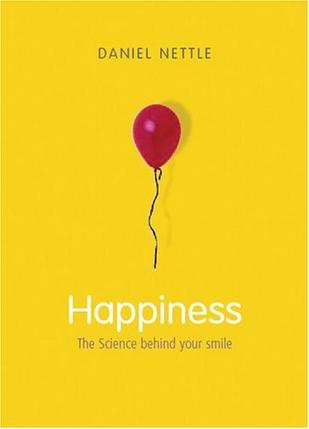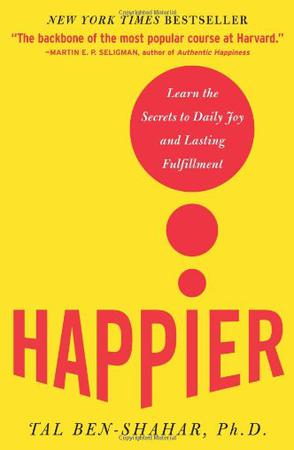欢迎来到相识电子书!
标签:幸福學
-
Happiness
What exactly is happiness? Can we measure it? Why are some people happy and others not? And is there a drug that could eliminate all unhappiness? People all over the world, and throughout the ages, have thought about happiness, argued about its nature, and, most of all, desired it. But why do we have such a strong instinct to pursue happiness? And if happiness is good in itself, why haven't we simply evolved to be happier? Daniel Nettle uses the results of the latest psychological studies to ask what makes people happy and unhappy, what happiness really is, and to examine our urge to achieve it. Along the way we look at brain systems, at mind-altering drugs, and how happiness is now marketed to us as a commodity. Nettle concludes that while it may be unrealistic to expect lasting happiness, our evolved tendency to seek happiness drives us to achieve much that is worthwhile in itself. What is more, it seems to be not your particular circumstances that define whether you are happy so much as your attitude towards life. Happiness gives us the latest scientific insights into the nature of our feelings of well-being, and what these imply for how we might live our lives. -
积极心理学
《积极心理学:关于人类幸福和力量的科学》在内容上,以幸福感为核心,系统介绍积极心理学各个领域的研究成果。第一章幸福,探讨幸福与幸福感内涵、产生机制与影响因素,以及幸福感的测量与促进方法。幸福与幸福感是积极心理学的核心目标。作为一门科学,积极心理学关注的是如何理解和解释幸福和主观幸福感,并准确地预测影响它们的因素。作为一种临床实践,积极心理学更为关注的是如何增进主观幸福感,而不是矫治心理缺陷。因此,积极心理学是对传统临床心理学的补充,而不是替代。第二章沉浸体验,沉浸体验是人们在受其内在动机驱使从事具有挑战性且可控的任务时所经历的一种独特的心理状态。本章介绍了与沉浸体验现象密切相关的内在动机理论和逆转理论,以及“手段一目的思维方式”和“活动取向思维方式”之间的相互转换。第三章希望和乐观,探讨希望与乐观产生的心理机制、神经生物学基础,以及有关希望与乐观的理论及其对促进乐观、希望与快乐的启示。第四章情绪智力,探讨情绪智力的内涵、情绪智力的年龄发展、影响因素,以及情绪智力研究对于增进幸福感的意义。第五章天赋、创造力与智慧,阐述了天赋的涵义,天才儿童的遗传和环境因素、家庭背景和心理调节能力以及神经生理学基础;介绍了Sternberg和Lubart的创造力投资理论,以及创造力的发展阶段及其相关因素;描述了理解智慧的不同概念模型,包括在人格和认知发展成熟阶段的智慧以及智慧的平衡理论。第六章积极特质与动机,描述了人格特质的五因素理论,积极品质的毕生发展及其遗传和环境基础,评估方法,特质型动机和状态型动机及其促进幸福感的临床意义。第七章积极自我,阐述了主体自我与客体自我的概念,自尊的测量,自尊的发展与影响因素,以及自我效能感的来源、作用与评定;阐述了各种心理应对策略、适应性防御机制的发展和相关因素,以及应对方式和防御机制的评定方法。第八章积极关系,讨论了在家庭、婚姻与友谊中社会关系的积极发展及其影响因素和评估方法,以及对于促进幸福的社会生活的临床意义。第九章积极改变,描述了在咨询与治疗等临床实践中,积极改变的过程、阶段与技术,及其对于促进幸福感的意义。《积极心理学:关于人类幸福和力量的科学》既可以作为心理学、教育学、社会学和医学等相关专业大学生和研究生学习的教材或教学参考书,又可以作为广大普通读者开发自身潜能、培养积极心理品质、获得幸福生活的自助读物。 -
Happier
Can You Learn to Be Happy? YES . . . according to the teacher of Harvard University’s most popular and life-changing course. One out of every five Harvard students has lined up to hear Tal Ben-Shahar’s insightful and inspiring lectures on that ever-elusive state: HAPPINESS. HOW? Grounded in the revolutionary “positive psychology” movement, Ben-Shahar ingeniously combines scientific studies, scholarly research, self-help advice, and spiritual enlightenment. He weaves them together into a set of principles that you can apply to your daily life. Once you open your heart and mind to Happier ’s thoughts, you will feel more fulfilled, more connected . . . and, yes, HAPPIER. “Dr. Ben-Shahar, one of the most popular teachers in Harvard’s recent history, has written a personal, informed, and highly enjoyable primer on how to become happier. It would be wise to take his advice.” --Ellen J. Langer, author of Mindfulness and On Becoming an Artist “This fine book shimmers with a rare brand of good sense that is imbedded in scientific knowledge about how to increase happiness. It is easy to see how this is the backbone of the most popular course at Harvard today." --Martin E. P. Seligman, author of Authentic Happiness -
幸福的方法
你幸福吗?什么是幸福?怎样才能获得幸福?有的人只追求眼前的享乐,不关心未来的幸福;有的人历经坎坷,抱怨世态炎凉,放弃了寻找幸福;有的人拥有财富、地位和名望,但内心仍然感受不到幸福;有的人奔波劳碌,把快乐的期望放在未来,却无法享受当下的幸福;今天,从西方到东方,在物质日益丰富的同时,许多人精神迷失;“郁闷”成了人们的口头禅;我们身边的郁抑症患者急剧增加;多少无助的心灵在痛苦中徘徊和挣扎。 有关“幸福”的研究表明,人的幸福感主要取决于三个因素:遗传基因、与幸福有关的环境因素,以及能够帮助我们获得幸福的行动。本书用积极心理学的最新科学研究成果和传统智慧精华,教给你提升幸福指数的方法。成千上万的哈佛学生通过泰勒博士的课程,找到了快乐、幸福和持久的满足感。那么你呢? 幸福,是可以通过学习和练习获得的。读这本书,按书中的方法去思考和坚持练习,你便开始踏上了获得持久快乐、幸福和满足感的旅程。 本书目前已被翻译成16 种文字在全球近20个国家和地区出版发行,给饱受忧郁和心灵困惑折磨的人们带来福祉,使他们轻松获得了追求幸福和持久满足感的方法。 本书读者群:本书适用于所有想追求幸福生活、获得长久满足感并提高幸福指数及改善生活质量的人们;尤其适用于情绪忧郁、对生活不自信、对未来不报希望、有悲观倾向的人们;同时也适用于对积极心理学感兴趣的广大读者、心理学爱好者、心理学专业教师学生,以及心理治疗从业人员。
热门标签
下载排行榜
- 1 梦的解析:最佳译本
- 2 李鸿章全传
- 3 淡定的智慧
- 4 心理操控术
- 5 哈佛口才课
- 6 俗世奇人
- 7 日瓦戈医生
- 8 笑死你的逻辑学
- 9 历史老师没教过的历史
- 10 1分钟和陌生人成为朋友




